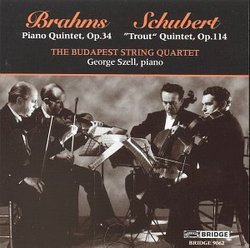| All Artists: Budapest String Quartet Title: Brahms / Schubert : Szell / Budapest Quartet Members Wishing: 0 Total Copies: 0 Label: Bridge Original Release Date: 1/1/1945 Re-Release Date: 2/20/1996 Genres: Special Interest, Classical Styles: Chamber Music, Historical Periods, Classical (c.1770-1830), Modern, 20th, & 21st Century Number of Discs: 1 SwapaCD Credits: 1 UPC: 090404906220 |
Search - Budapest String Quartet :: Brahms / Schubert : Szell / Budapest Quartet
 | Budapest String Quartet Brahms / Schubert : Szell / Budapest Quartet Genres: Special Interest, Classical
|
Larger Image |
CD Details |
CD ReviewsAn exceptional "Trout" makes this an indispensable disc for Discophage | France | 09/01/2006 (4 out of 5 stars) "These two recordings were made live at the Library of Congress, where the Budapest Quartet was in residence, respectively in 1945 and 1946; what medium they had been preserved on and served as a basis for these transfers is not made clear by the accompanying booklet. The sound is rather small-scaled, but relatively free of surface noise, except for the beginning of the famous Trout variations, where what appears like surface noise or radio static becomes obtrusive. Still, despite the sonic shortcomings, this is a good interpretation of the Brahms quintet, and a reading of exceptional stature in Schubert's "Trout" quintet. The Budapest Quartet shows none of the intonational problems that were to mar their later recordings from the mid 50s on. On the contrary, they display fine individual and ensemble tone with only a couple of intonation slips (more in Brahms than in Schubert) obviously due to the live conditions of both recordings. Their collaboration with George Szell, here acting in the unusual role of pianist, results in a perfect balance between piano and strings. Szell had then not yet established his stature as the exceptional and long-standing leader of the Cleveland Orchestra, though his tenure there was about to begin, but he was already very much in view in the US after various engagements with Toscanini's NBC orchestra as well as at the Met. He shows here what a fine pianist he also was, with crisp and energetic playing. Their Brahms quintet is a good but not exceptional reading. In the opening "Allegro non troppo", Szell and his partners have a tendency to sometimes let the search for interiority prevail over the sustaining of forward-moving tension; there is more adrenalin with Serkin-Busch (EMI) or, among stereo versions, Eschenbach-Amadeus (DG) or Haas-Berlin Octet members (Philips). In the 2nd movement they are true to Brahms' tempo indication of "Andante, un poco adagio" in that they chose a pace that is slightly more animated than what is usually heard, but they lack some interiority in some passages for want of real string pianissimo. In the Scherzo they go for the ominous build-up and release of energy rather than the headlong race - and the effect is slightly ponderous; in addition, despite the slowish tempo, ensemble is pretty ragged at the end of the outer Allegro sections; on the other hand, the players are able to unfold a long lyrical line in the central trio without slowing down the tempo (Brahms marks no tempo change here). Their Finale, with a nice, slow introduction, has plenty of bounce but various intonation problems and even a missed entry from 1st violin Josef Roismann; the coda starts with scrappy ensemble and cautious tempo, but soon develops into great fire and wild passion. In Schubert, joined by double-bass player Georges Moleux, Szell and the three remaining members of the Quartet favour brisk tempos throughout, and their reading is muscular, firmly accented and full of rhythmic bite, but with no lack of charm and deeply-felt lyricism (try the 2nd movement' cantilena at 1:20). There is no mawkish slowing down of the Scherzo's (3rd movement) central trio section, but in the 4th movement (the famous variations on the "Trout" theme), they make a big slow down for the 5th variation which they treat as a "slow movement" within the variation movement, rather than maintaining a certain unity of tempo, and their coda is genial and easy-going. Their finale again is brisk and spirited, almost hard-driven. Despite the flaws of their Brahms reading, their exceptional Schubert makes this an essential disc for any admirer of the Budapest Quartet and/or of George Szell. " Superb, distinctive performance WalpoleBassMan | 04/21/2006 (5 out of 5 stars) "I have performed and listened to the Trout countless times and this masterpiece reveals something more of itself with each listening. The perfomance is enthralling and, for those brought up listening to more "modern" playing, somewhat unusual. The double-bass playing is a little gruff by modern standards (maybe the recording?) but the viola and 'cello ensemble playing is nonpareil and Szell's playing surprised me by it's virtuosity as well as musicality.
(I listened only briefly to the Brahms so I will reserve comment)." |

 Track Listings (10) - Disc #1
Track Listings (10) - Disc #1